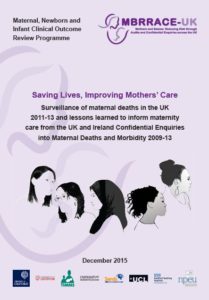ISA’s response to the MBRRACE-UK report

The International Stillbirth Alliance (ISA) welcome the publication of the MBRRACE-UK report ‘Saving Lives, Improving Mothers’ Care 2015’[1] with its focus on the factors contributing to maternal deaths. The report highlights the value of coordinated mental health, maternity and primary care services before and during pregnancy as well as following the birth, if we are to prevent avoidable harm to mothers. The authors conclude that we need to practice the parent-centred care that we preach.
The range of factors contributing to maternal deaths includes both physical and mental health issues. For example, the MBRRACE report noted that domestic abuse and violence were associated with stillbirth and other complications, including low weight babies, preterm birth, and bleeding in pregnancy. Domestic abuse is a complex issue, and we hope that the report will help ensure that appropriate attention is given to women who are the victims of such abuse not just around the time of pregnancy and birth but also afterwards.
Venous thrombo-embolism (VTE) is a major factor in maternal deaths. MBRRACE highlights that stillbirth is an independent risk factor for venous thromboembolism, as shown in recent studies2. Every effort must be made to reduce the number of pregnant women who die from VTE. Obesity, advanced age, and smoking are strong risk factors for both stillbirth and VTE, so it is important to reduce risks for women by paying attention to both their medical and emotional state.
The MBRRACE report identifies that the loss of a baby, through miscarriage, stillbirth or the death of the newborn baby, increases the risk for mothers developing mental illness. Of note, some of the maternal deaths from suicide occurred in this group of women. The Lancet Stillbirth Series (LSS) 2016, due for publication in January 2016, shows that the impact of stillbirth on women, families, and society is wide reaching and long lasting and extends far beyond pregnancy. Grief is a natural response after the death of a baby, but mental illness is not uncommon and affects not just women but also their partners, as shown in the LSS.
ISA calls for urgent attention to improve the quality of all care after stillbirth and neonatal death, including bereavement care, with better coordination of healthcare providers and teams. We agree with MBRRACE, that additional monitoring and support might be needed for bereaved mothers, and we invite initiatives to understand what this support should entail for these women and their partners. With health care providers and parents working together, we aim to identify and support implementation of appropriate solutions, so that bereaved parents do not come to unnecessary harm.
Dimitrios Siassakos (Co-chair, Scientific Committee), Vicki Flenady (Co-chair, Scientific Committee), Alex Heazell (Chair, Executive Board) and Claire Storey (Co-chair, Executive Board), and the ISA Board, on behalf of ISA.
[1] Knight M, Tuffnell D, Kenyon S, Shakespeare J, Gray R, Kurinczuk JJ (Eds.) on behalf of MBRRACE-UK. Saving Lives, Improving Mothers’ Care – Surveillance of maternal deaths in the UK 2011-13 and lessons learned to inform maternity care from the UK and Ireland. Confidential Enquiries into Maternal Deaths and Morbidity 2009-13. Oxford: National Perinatal Epidemiology Unit, University of Oxford 2015. 2 Sultan AA, Tata LJ, West J, Fiaschi L, Fleming KM, Nelson-Piercy C, Grainge MJ. Risk factors for first venous thromboembolism around pregnancy: a population-based cohort study from the United Kingdom. Blood. 2013 May 9;121(19):3953-61.
Read the MBRRACE report here
